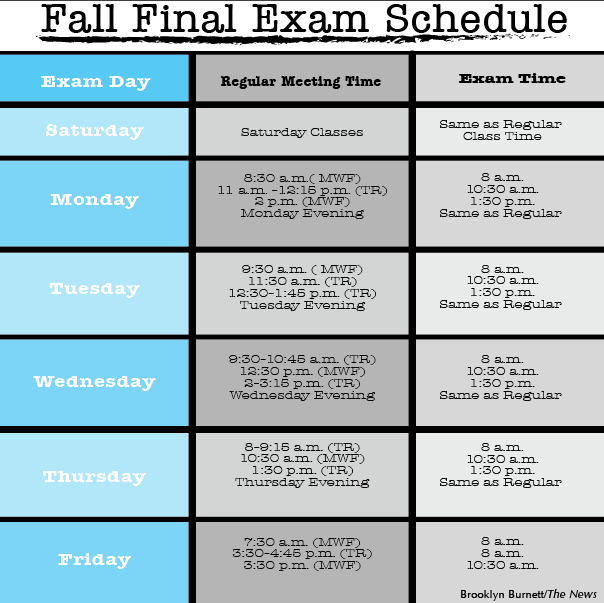Levi Brandenburg
Contributing Writer
lbrandenburg1@murraystate.edu
Breanna Harris
Contributing Writer
bharris17@murraystate.edu
Sarah Yeckering
Contributing Writer
syeckering@murraystate.edu
Murray State offers academic and mental health resources for students to utilize as finals week approaches.
Finals week takes place from Dec. 7 to Dec. 13. To help students prepare academically, Waterfield Library will begin staying open for 24 hours starting Monday, Dec. 9.
Jeff Wylie, assistant professor of social work, said students should figure out what their best method of studying is.
“My number one tip is to set aside chunks of time to study and build in breaks where you do fun things for 15 to 20 minutes and then get back to your studying,” Wylie said. “Study in the way you learn – visual or tactile learners both need to see it, maybe re-write notes or do mind-maps or doodles to help you remember. Auditory learners need to study ‘out loud.’ I used to walk up and down the halls of the dorm reciting or reading my notes. Another good tip is to teach it to someone else. We remember up to 95 percent of what we teach to others, so it you know it well enough to teach it, you will be in good shape.”
As finals week can take a lot of time and work, students can struggle with their mental health as well.
According to a survey by MentalHelp in 2016, based on more than 1000 students and more than 2.9 million tweets from college campuses, 31 percent of college students said finals season was the biggest source of their stress during the semester.
One common way many students prepare for finals is by cramming where they study everything from a semester-long class in only short period of time.
“Last semester, in my physics class, I had to get a 50 to pass,” Zach Harding, junior from Newburgh, Indiana said. “I studied for a week and crammed before the test, and I still barely passed.”
Angie Trzepacz, director of University Counseling Services, said cramming is not only not effective, but is also adds to students’ stress.
“The best way to prepare for finals is to start from the beginning of the semester: attend all class sessions, take notes, read over your notes after each class and possibly rewrite them, make flashcards when appropriate, set up group study sessions with some of your classmates, etc,” Trzepacz said. “The worst way to prepare for finals is to wait until the end of the semester and try to do an overnight cram session to learn all the material for the whole semester.”
However, some students aren’t able to focus on finals because they have several assignments due the week before finals.
“Honestly, I’m not too worried about finals this semester,” Harding said. “The problem is that, right now when I should be studying, I have assignments and work to do. I have three writing assignments and a project all due during dead week. It complicates things.”
Trzepacz said one of the best things students can do in stressful situations is focus on self-care.
“Mental health and physical health are closely related and can impact each other significantly, and both of them can impact your functioning,” Trzepacz said. “Even if you feel like you don’t have enough time for it, it is important to make time for sleeping, eating, exercising and relaxing. If you are tired, hungry or tense, you can’t focus and concentrate as well, so find time for those activities in your schedule.”
Cara Braido, mental health specialist said, students should also ensure they are getting enough sleep.
“Eight to 10 hours of sleep is recommended for young adults, however for most college students, this is not realistic,” Braido said. “So, students should be getting at least six hours of sleep a night.”
The Counseling Center is open during finals, and an on-call counselor is available from 9 a.m. to 3 p.m. Monday through Friday if students are in need of help.


























































































